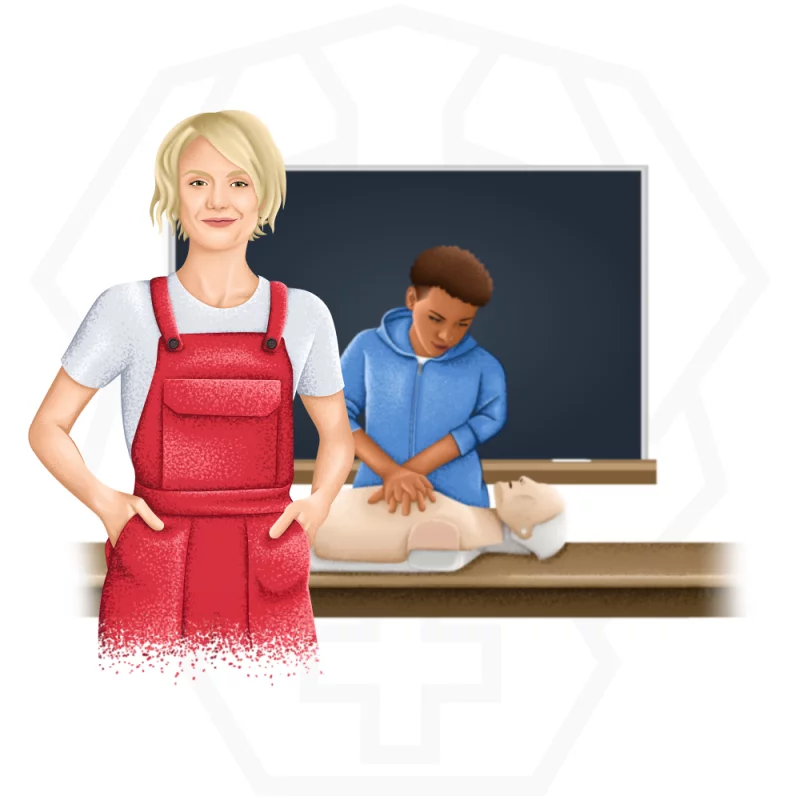October 24, 2024
CPR Training
A Requirement for 3rd grade high school students in Quebec
Since 2018, the ministère de l'Éducation of Quebec has introduced an important requirement in the school curriculum: all 9th-grade students must undergo cardiopulmonary resuscitation (CPR) training. This mandate aims to equip young people with essential first-aid skills, allowing them to act quickly and effectively in medical emergencies. This article will explore the standards associated with this training, the reasons behind the requirement, and how the Saint-Bernard Academy can support teachers in its implementation.
CPR STANDARDS 3RD GRADE HIGH SCHOOL STUDENTS
The CPR training program, mandated by the Ministère de l'Éducation, aims to teach students the basic life-saving techniques needed during a cardiac arrest. Schools are required to ensure that each student receives this mandatory training. The standards typically include:
- Practice of Chest Compressions
Students learn how to perform effective chest compressions, following the appropriate rhythm and depth.
- Use of an Automated External Defibrillator (AED)
The training also covers the use of an AED, an essential device for restoring a normal heart rhythm.
- Choking Intervention
Techniques for clearing airway obstructions are taught for choking emergencies.
A specific budget allocation has been added to the financial rules of school boards to ensure that this training is implemented in all schools. This allocation allows schools to either hire a certified first aid organization to train students or ensure that one or more volunteer instructors within the school are trained to deliver the course.
WHY IS THIS REQUIREMENT IN PLACE?
The implementation of CPR training for these students stems from several important reasons:
- Increasing Survival Chances
Cardiac arrests can happen at any time and in any setting. By training students in CPR, the Ministère de l'Éducation aims to increase the number of people capable of performing life-saving actions, significantly improving the survival rates of victims.
- Empowering Young People
Training students in CPR helps to foster a sense of responsibility and civic duty. They become potential responders in the emergency chain of survival.
- Spreading First Aid Skills
By making this training mandatory, the government promotes the spread of first-aid knowledge throughout the general population, contributing to a safer and better-prepared society for medical emergencies.
SAINT-BERNARD ACADEMY: A PARTNER TO SUPPORT TEACHERS
To help schools comply with this requirement, Saint-Bernard Academy offers a comprehensive and flexible solution. With its unique, customized training platform, the Academy enables teachers to provide CPR training in a way that meets their and their students' needs.
- Comprehensive Pedagogical Support
Saint-Bernard Academy has developed a support package that includes more than fifteen educational documents, training guides, and interactive visual aids. Teachers are provided with all the necessary tools to deliver the course effectively.
- Flexible Training Formats
The Academy offers three formats for the training: online, hybrid (combining online and in-person courses), or fully in-person. This flexibility allows schools to choose the format that best suits their context and students' preferences.
- Technical Support and Teacher Training
For schools that opt to train an internal instructor, Saint-Bernard Academy offers instructor training and technical support to ensure that courses are delivered according to the latest first-aid standards.
CONCLUSION
The mandatory CPR training for 3rd grade high school students is a valuable initiative that contributes to making Quebec a safer society. By equipping young people with vital first-aid skills, the Ministère de l'Éducation and schools play an essential role in preventing deaths from cardiac arrest. With its tailored training solution, Saint-Bernard Academy stands out as a key partner in helping schools succeed in this educational mission.
